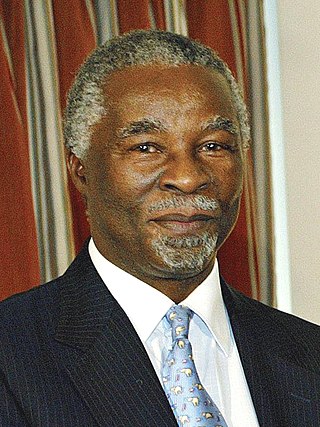
Thabo Mvuyelwa Mbeki is a South African politician who served as the second president of South Africa from 14 June 1999 to 24 September 2008, when he resigned at the request of his party, the African National Congress (ANC). Before that, he was deputy president under Nelson Mandela from 1994 to 1999.
The National Intelligence Agency (NIA) was the previous name of an intelligence agency of the South African government. Currently it is known as the Domestic Branch of the State Security Agency. It is responsible for domestic and counter-intelligence within the Republic of South Africa. The branch is run by a Director, who reports to the Director-General of the State Security Agency. The Director is also a member of the National Intelligence Co-Ordinating Committee (NICOC).
The National Intelligence Co-ordinating Committee (NICOC) is the organisation responsible for co-ordinating the actions and activities of all of South African intelligence agencies, and collating the intelligence information received from them. It reports to Cabinet level via the Minister of State Security, and is similar to the British Joint Intelligence Committee.
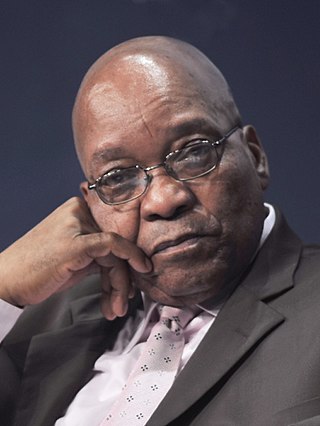
Jacob Gedleyihlekisa Zuma is a South African politician who served as the fourth president of South Africa from 2009 to 2018. He is also referred to by his initials JZ and clan names Nxamalala and Msholozi. Zuma was a former anti-apartheid activist, member of uMkhonto we Sizwe, and president of the African National Congress (ANC) from 2007 to 2017.
Schabir Shaik is a South African businessman from Berea, Durban, who rose to prominence due to his close association with former South African President Jacob Zuma during Zuma's time as Deputy President. On 2 June 2005, he was found guilty of corruption and fraud, which also led to Zuma's dismissal by then President Thabo Mbeki.

The National Prosecuting Authority (NPA) is the agency of the South African Government responsible for state prosecutions. Under Section 179 of the South African Constitution and the National Prosecuting Authority Act of 1998, which established the NPA in 1998, the NPA has the power to institute criminal proceedings on behalf of the state and to carry out any necessary functions incidental to institution of criminal proceedings. The NPA is accountable to Parliament, and final responsibility over it lies with the Minister of Justice and Correctional Services.
The Schabir Shaik trial was an important court trial in post-apartheid South Africa. The case, tried in the Durban and Coast Local Division of the High Court before Judge Hilary Squires, established a fraudulent and corrupt relationship between Durban-based businessman Schabir Shaik and former South African leader Jacob Zuma.
Nkosinathi Phiwayinkosi Thamsanqa Nhleko is a South African politician and former trade unionist from KwaZulu-Natal. He was the Minister of Police and Minister of Public Works in the second cabinet of President Jacob Zuma. After he was sacked from the cabinet in 2018, he served as a backbencher in the National Assembly until the 2019 general election.
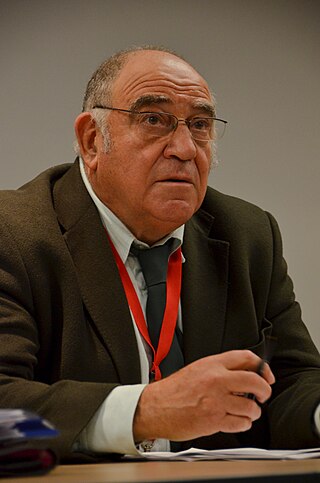
Ronald Kasrils is a South African politician, Marxist revolutionary, guerrilla and military commander. He was Minister for Intelligence Services from 27 April 2004 to 25 September 2008. He was a member of the National Executive Committee (NEC) of the African National Congress (ANC) from 1987 to 2007 as well as a member of the Central Committee of the South African Communist Party (SACP) from December 1986 to 2007.

Sathyandranath Ragunanan "Mac" Maharaj OLS is a retired South African politician, businessman, and former anti-apartheid activist. A member of the African National Congress (ANC), he was the first post-apartheid Minister of Transport from 1994 to 1999. He was later the official spokesperson to the President of South Africa, Jacob Zuma.

The Strategic Defence Package, popularly known as the Arms Deal, was a major defence procurement programme undertaken to re-equip the South African armed forces for the post-apartheid era. It is commonly associated with the large-scale corruption that is alleged to have taken place during and after the procurement process. Some critics have said that the Arms Deal was a defining moment or turning point for the African National Congress (ANC) government, less than five years into its tenure.
Zakeria Mohammed "Zak" Yacoob is a retired South African judge who served in the Constitutional Court of South Africa from February 1998 to January 2013. He was appointed to the bench by Nelson Mandela and retired after serving the maximum 15-year term. Before he joined the bench, he was a practising advocate and an anti-apartheid activist.
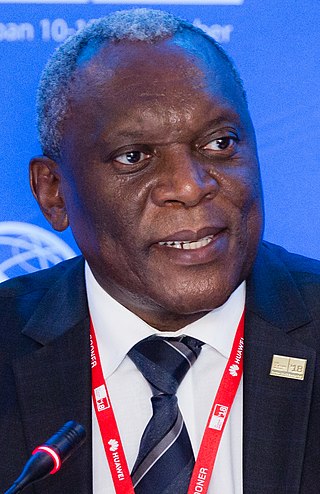
Siyabonga Cyprian Cwele is a South African politician who served in the cabinet of South Africa from September 2008 to May 2019, most recently as the Minister of Home Affairs between 2018 and 2019. He was appointed as the South African Ambassador to China in December 2020. He is a member of the African National Congress (ANC) and represented the party in Parliament from 1994 to 2019.
Penuell Mpapa Maduna is a South African politician and businessman. An anti-apartheid activist in his youth, Maduna was appointed to President Nelson Mandela's government in 1994. Thereafter he served as Minister of Mineral and Energy Affairs and, between 1999 and 2004, as Minister of Justice and Constitutional Development. Holding a doctorate of law from Unisa, he was also a long-time legal adviser to his party, the African National Congress, which he represented during the negotiations to end apartheid.
Arthur Fraser is a South African civil servant and former intelligence operative who was head of the State Security Agency from 2016 to 2018 and National Commissioner for Correctional Services from 2018 to 2021. He was previously an anti-apartheid activist in the African National Congress, a senior official in the now-defunct National Intelligence Agency, and briefly a senior official in the Department of Home Affairs.
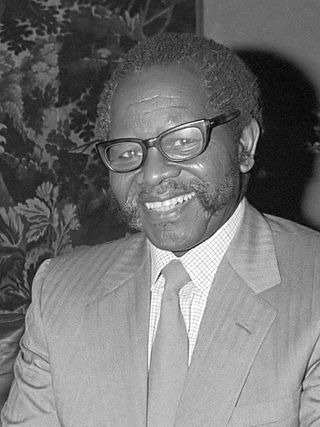
Operation Vula was a secret domestic programme of the African National Congress (ANC) during the final years of apartheid in South Africa. Initiated in 1986 at the ANC headquarters in Lusaka and launched in South Africa in 1988, its operatives infiltrated weapons and banned ANC leaders into the country, in order to establish an underground network linking domestic activist structures with the ANC in exile. It was responsible for facilitating the only direct line of communication between ANC headquarters and Nelson Mandela, who at the time was imprisoned and was discussing a negotiated settlement with the government on the ANC's behalf. The operation was disbanded in 1990, after its existence had been publicly revealed and eight of its leaders charged under the Internal Security Act with terrorism and plotting an armed insurrection.
Jacob Zuma, the former president of South Africa, is currently facing criminal charges relating to alleged corruption in the 1999 Arms Deal. He was first indicted on the charges in June 2005, but attempts to prosecute him have been beset by legal challenges and political controversy. He is currently charged with two counts of corruption, one count each of racketeering and money laundering, and twelve counts of fraud, all arising from his receipt of 783 payments which the state alleges were bribes from businessman Schabir Shaik and French arms company Thales.
William Andrew "Willie" Hofmeyr is a South African lawyer and former politician who was Deputy National Director of Public Prosecutions from 2001 to 2019. He was the founding head of the National Prosecuting Authority's Asset Forfeiture Unit from 1999 to 2011 and the head of the Special Investigating Unit from 2001 to 2011. Although he was removed from the AFU by Shaun Abrahams in 2015, he returned in 2019 before he retired late that year.
Sizakele Whitmore Sigxashe was a South African anti-apartheid activist and intelligence officer. He was the inaugural director-general of the post-apartheid National Intelligence Agency between 1995 and 1999.








